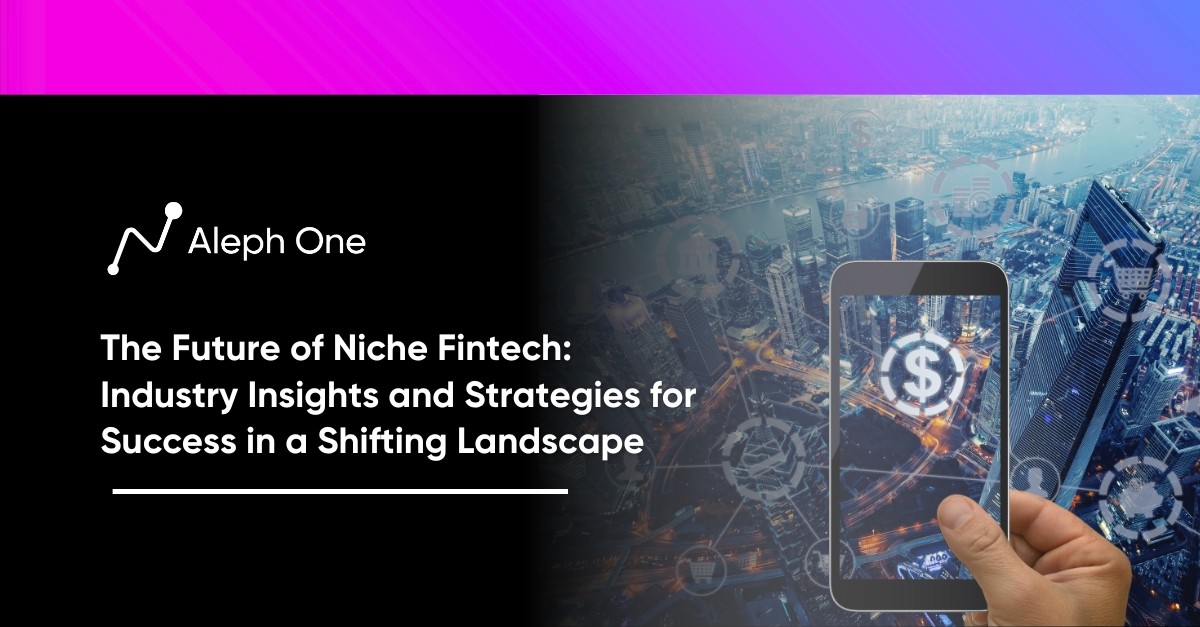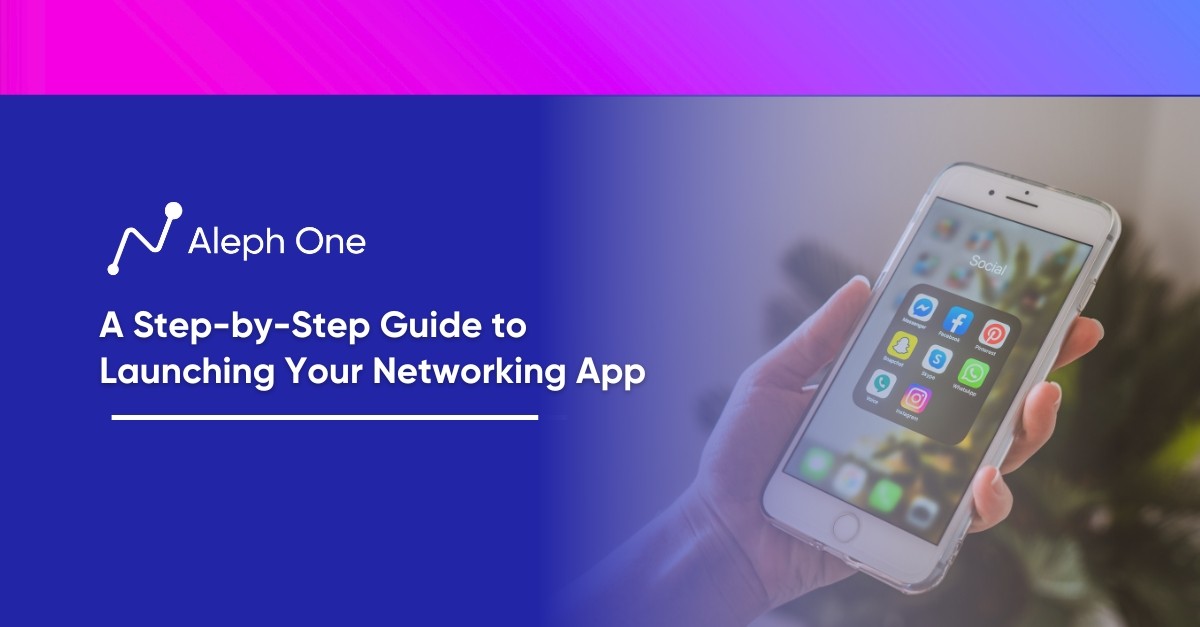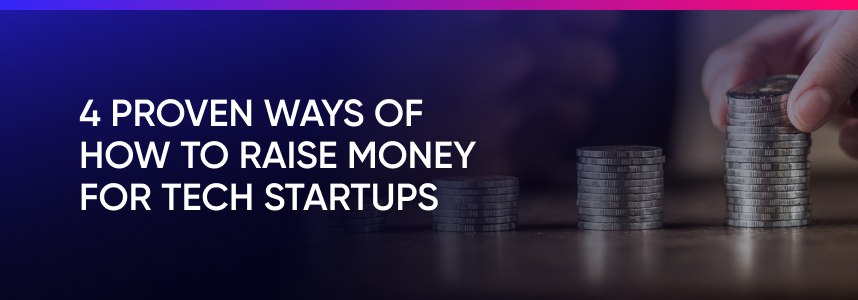Let’s work together to build something amazing. Share your project details and our team will reply to figure out the next steps to your success.

The fintech industry is undergoing a transformative period driven by emerging trends and technological advancements. This article explores the future of niche fintech, providing valuable insights and strategies for success in a rapidly shifting landscape. From the rise of digital payments and the role of artificial intelligence in personalized banking to the potential of blockchain for security and the importance of leveraging the freelance economy. We will elaborate on critical areas shaping the future of fintech. Additionally, highlight predictions for the mainstream adoption of blockchain and digital currencies, the emergence of finance super apps, and the pivotal role of AI and data analytics in hyper-personalized banking experiences. With these developments on the horizon, fintech companies that embrace innovation and adapt to changing consumer needs stand to thrive in the future.

The Rise of Digital Payments: How Fintech is Transforming Transactions
Digital payments are rapidly replacing cash as the preferred transaction method. According to recent research, global digital payment revenues are expected to grow by over 23% between 2019 to 2023, reaching $10.07 trillion. The COVID-19 pandemic has accelerated the adoption of contactless digital payments as people seek safer ways to pay without handling cash.
Paypal, Venmo, and Cryptocurrencies
Solutions like PayPal, Venmo, and cryptocurrencies have made digital payments more convenient and accessible. PayPal currently has over 300 million active accounts, while Venmo processed over $27 billion in peer-to-peer payments in the first quarter of 2020 alone. Cryptocurrencies enable borderless payments using blockchain technology, though mainstream adoption remains limited.
Mobile Payments
Mobile payments are poised for explosive growth, reaching $12.4 trillion by 2023. Services like Apple Pay, Google Pay, and Samsung Pay are driving this trend, with over 1 billion global users. Mobile payments are ubiquitous in China, accounting for 80% of all payments.
Cash is Declining
Cash usage is declining rapidly. Several countries have seen cash transactions decrease by 50% in the last decade. In Sweden, cash transactions now make up less than 2% of the total, according to the central bank. This trend is especially pronounced in younger generations.
The future of payments is digital, and fintech companies are leading the charge. By offering convenient, secure, and personalized digital payment options, fintechs are poised to accelerate the decline of cash and transform the way we conduct transactions in the coming decade. For consumers, this means more straightforward and innovative ways to pay; for businesses, lower costs and the opportunity to gain valuable customer insights. The rise of digital payments is a win-win for the economy overall.
AI and the Future of Personalized Banking
Artificial intelligence and machine learning enable fintech companies to offer highly personalized banking services tailored to customers. By analyzing users’ financial data and spending habits, AI can provide customized insights and recommendations to help people better manage their money.
Digit and Cleo – Leveraging AI
Companies like Digit and Cleo leverage AI to personalize the banking experience. Digit analyzes customers’ income, spending, and saving patterns to determine how much they can afford to set aside each week. The app automatically transfers that amount from the customer’s checking to their Digit savings account. Cleo takes a similar approach, using AI to analyze a customer’s income and expenses and then providing a personalized assessment of their financial health and customized recommendations for improving it.
AI Transforming the Banking Industry
According to a report from Accenture, 83% of banking executives believe AI will significantly transform the industry within the next three years. Many see personalization as the top benefit. AI can potentially create a “segment of one” in banking, tailoring each experience precisely to individual customers based on their unique financial situations and needs.
Machine Learning and Virtual Financial Assistants
Fintechs also use machine learning to power virtual financial assistants to understand customers’ questions and provide answers and recommendations. For example, Cleo’s chatbot can walk users through their monthly spending by category, flagging areas where they exceeded budget and suggesting ways to cut costs. Using natural language processing, Cleo understands complex and nuanced questions about personal finance and can give personalized guidance.
While mainstream banks are also investing in AI, fintechs have been leading the way in using artificial intelligence to personalize the banking experience. They have placed personalization at the core of their value proposition, using technology to build a customized experience for each customer based on their financial data and interactions with the product over time. With the power of AI and machine learning, fintech is delivering on the promise of personalized banking in a data-driven and human-centric way.
Blockchain: An Uncrackable Code for Security?
Blockchain technology has long been touted as a solution to enhance security and transparency in the fintech industry. Blockchain creates an immutable digital ledger of transactions distributed across a computer network. This makes it impossible to hack or manipulate records. For fintech, blockchain could help verify digital identities, process insurance claims, and facilitate cross-border payments.
Cambridge Blockchain – Controling Digital Identities
Some promising startups leverage blockchain for security solutions. For example, Cambridge Blockchain uses blockchain to control individuals’ digital identities. Their platform allows users to manage personal data and share verified credentials with third parties. This could help prevent identity theft and fraud for fintech services.
The Risk of Blockchain
However, blockchain is not an uncrackable code. While the distributed network protects against cyber threats, blockchain systems can still be vulnerable to bugs, hacking, and theft. And blockchain only protects the data on the chain—if personal information is stolen before it is added to the chain, blockchain does not help. After the initial hype, these realities have contributed to a more cautious outlook for blockchain.
Blockchain Needs More Time and Regulation Before Mass Adoption
Despite promising applications, mainstream adoption of blockchain for fintech security could be faster. Regulatory uncertainty remains as governments determine how to classify and regulate digital currencies and other crypto assets. Many consumers still need to understand blockchain fully, hindering adoption.
Blockchain Continues to Advance and Scale in the Fintech Space
However, blockchain could gain more traction for fintech security over the next 5 to 10 years. As blockchain networks become more advanced, secure, and scalable, and as regulatory frameworks are clarified, fintech companies will likely implement blockchain solutions more widely. Some possibilities include the following:
- Digital identity verification: Blockchain could be used to verify users’ identities for account opening, reducing fraud risk.
- Secure transaction processing: Blockchain may facilitate faster, more transparent payments and lending transactions between fintechs and consumers.
- Fraud detection: Fintechs could analyze transaction data on the blockchain to detect fraudulent activity more quickly.
- Smart contracts: Blockchain-based smart contracts could automatically verify and execute fintech agreements and processes with high security and accuracy.
While blockchain may not solve all security issues, its potential to strengthen data protection and transaction verification could make it an essential technology for the future of fintech. With further innovation, blockchain could help build a more secure infrastructure for financial services in the digital age.
The Gig Economy Workforce: Why Every Fintech Needs Freelancers
Fintech companies are increasingly tapping into the freelance economy to access specialized talent on demand. By leveraging freelance workers with niche skills, fintechs can drive innovation without the costs and commitment of full-time employees. This “bionic workforce” combines human talent and AI to optimize productivity.
Toptal and Catalant
Companies like Toptal and Catalant are making it easy for fintechs to hire freelance software engineers, data scientists, and other technical roles. These marketplaces screen candidates to ensure high quality, enabling fintechs to fill critical positions in days rather than months. While full-time engineers can cost $100,000 or more in salary and benefits, freelance engineers charge between $50 to $200 per hour, offering significant cost savings.
Flexibility in Scaling Teams
The flexibility of freelancers also allows fintechs to scale their teams up and down as needed to match workloads. Suppose a fintech has a short-term data analysis or product development project, for example. In that case, they can quickly tap into freelance data scientists and engineers to meet demand without being overstaffed when projects are complete. This “on-demand” workforce is well suited to the fast-paced nature of fintech.
Fuels Fintech Content Creation and Design
Freelance talent also fuels fintech innovation in design, content creation, and digital marketing. For example, freelance writers and designers can help fintechs create blog posts, social media content, infographics, and other assets to engage customers and promote their brands. By diversifying their workforce across full-time and freelance roles, fintechs can drive greater creativity and new ways of thinking to solve problems.
Freelancing has become one of the economy’s fastest-growing sectors, with some estimates indicating freelancers will make up 50% of the U.S. workforce by 2027. The freelance model is popular with younger tech-savvy professionals, offering greater work-life balance and flexibility. Leveraging this growing freelance workforce is critical for fintechs to access in-demand skills, control costs, and accelerate innovation. By combining human talent and AI, fintechs can create a “bionic workforce” optimized for the digital age. The future of fintech will depend on the creative collaboration between humans and machines.
Open Banking: How Sharing Data is Transforming Fintech
Open banking regulations enable consumers to securely share their financial data with third parties, fueling fintech innovation. With the consumer’s permission, fintech companies can access information like account balances, transaction history, and spending habits to build customized products and services.
Open Banking Frameworks
Regions, including Europe, Australia, and parts of Asia, have implemented open banking frameworks. The EU’s PSD2 directive is the most comprehensive, requiring banks to provide customer data to registered third parties upon request. While the U.S. lacks an overarching open banking law, customer data access has expanded under provisions like the Dodd-Frank Act.
Plaid and Yodlee
Plaid and Yodlee are two significant players facilitating open banking data sharing. They provide secure APIs that connect fintech applications to users’ bank accounts. Using these services, fintech companies can access consumer banking data to power offerings like budgeting apps, digital wallets, and lending platforms.
Consumers Have More Control Over Financial Lives and Services
For consumers, open banking means more control over their financial lives and access to innovative new services. People could see all their accounts in one place, get customized product recommendations based on their spending habits, set financial goals, and track progress automatically.
Insights from Data-Driven Products
Fintechs benefit from a wealth of data to fuel personalized and data-driven products. They can gain deep insights into consumer needs and tailor solutions accordingly. For example, a lending startup could use cash flow data to determine a customer’s ability to repay a loan and provide a pre-approved offer. An investing app could suggest a customized portfolio based on the user’s financial situation and goals.
While promising, open banking also introduces privacy and security risks that fintechs must address to gain consumer trust. Strict data protection policies, transparency about data use, and consent for each data access request will be critical. Open banking could transform fintech if deployed responsibly by enabling truly personalized solutions based on a consumer’s unique financial profile. But its success will depend on whether fintech companies can prove they deserve access to people’s most sensitive data. Overall, open banking marks the start of a new era of innovation in financial services. With the potential benefits for both consumers and fintechs, it’s likely to drive massive changes in the future.
The Road Ahead: 3 Predictions for the Future of Fintech
Prediction 1: Blockchain and Digital Currencies Will Achieve Mainstream Adoption
Blockchain technology and cryptocurrencies are poised to move from a niche to a mainstream market within the next decade. As more people become familiar and comfortable with digital currencies and companies address regulatory concerns and improve the user experience, solutions like Bitcoin and Ethereum will gain broader consumer and institutional appeal.
Blockchain can increase transparency and security in cross-border payments, insurance claims, and digital identity. Major companies like JPMorgan and IBM are already experimenting with blockchain for payments and supply chain management. Meanwhile, central banks worldwide are considering developing digital versions of national currencies to modernize financial infrastructure.
Prediction 2: AI and Data Analytics Will Enable Hyper-personalized Banking
Artificial intelligence and machine learning will transform retail banking services by enabling highly customized experiences tailored to individual needs and goals. Using advanced data analytics, banks, and fintech companies will gain deep insights into customers’ financial lives and spending habits. They will then use those insights to provide personalized recommendations, advice, and relevant and timely product offers for each customer.
Prediction 3: “Finance Super Apps” Will Emerge
The next wave of fintech innovation will come in the form of “super apps” that aggregate various financial services in one place. Following companies like WeChat and Alipay in China, fintechs will develop mobile apps combining payments, lending, insurance, investing, budgeting tools, and other offerings. By bundling multiple services with a great user experience, super apps can gain a huge customer base and capture a large share of the fintech market.
Is Your Startup Ready to Adapt to the Rise of Fintech?
In summary, fintech is evolving rapidly, and the next decade will likely see significant shifts as new technologies and business models take hold. Although the future remains uncertain, blockchain, AI, open data, and super apps appear poised to drive substantial changes in financial services that will ultimately benefit both consumers and companies. The fintech startups and large incumbents that can harness these trends will be in the best position to succeed in the coming years.
FAQ
How has the COVID-19 pandemic specifically impacted the adoption of digital payments, beyond the general move towards contactless methods?
The COVID-19 pandemic has drastically expedited the transition from physical to digital payments. As health and safety became critical, consumers swiftly adopted digital payment methods to minimize physical contact. Moreover, with lockdowns and remote work scenarios, e-commerce increased significantly, further boosting digital payments. Businesses have also fast-tracked, providing digital solutions to cater to customer needs and stay competitive in the rapidly digitalizing economy.
Has the rise of freelancers and the gig economy influenced business strategies or operations in fintech companies?
The gig economy’s growth has significantly influenced business strategies in fintech companies. Given the rapidly evolving scope of fintech, flexibility, and agility are necessary. Freelancers bring specialized skills for innovative projects and can be an economical way for fintechs to access diverse and top-level expertise. Their inclusion in business operations allows for an adaptable business model with operational scalability to meet work-cycle demands and project-based needs.
Could you talk more about open banking regulations and their impact on global fintech innovation?
Open banking regulations have been a game-changer for the fintech sphere. They enable third-party developers to create useful financial services by accessing consumer banking, transaction, and other financial data. This level of transparency and data-sharing fosters innovation in the industry, leading to the development of more personalized and efficient solutions. However, it’s vital to ensure that data protection and privacy norms are strictly adhered to. While there are slight variations in regulations globally, the overarching aim is to empower consumers by enhancing their control over their financial data, thereby promoting competition and innovation in the industry.
Get the latest news and updates from Aleph One in your inbox.



